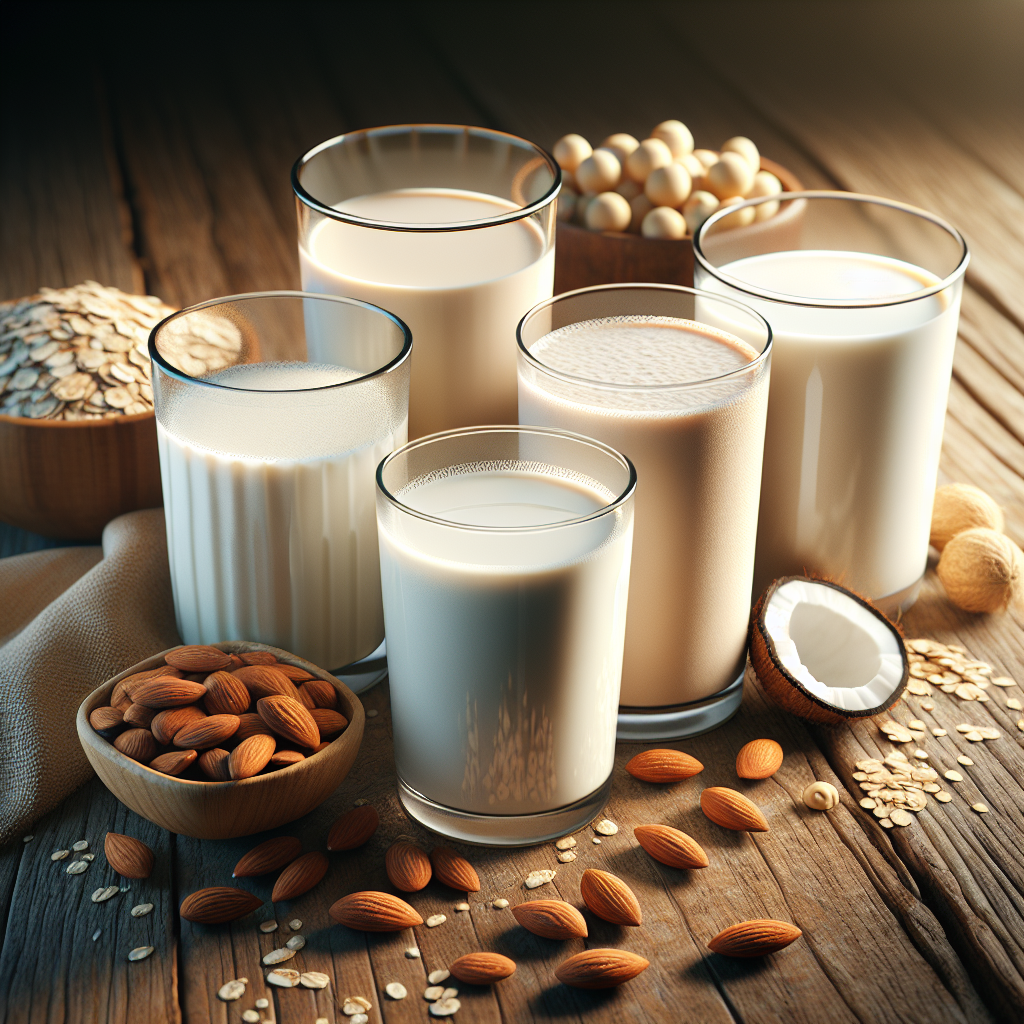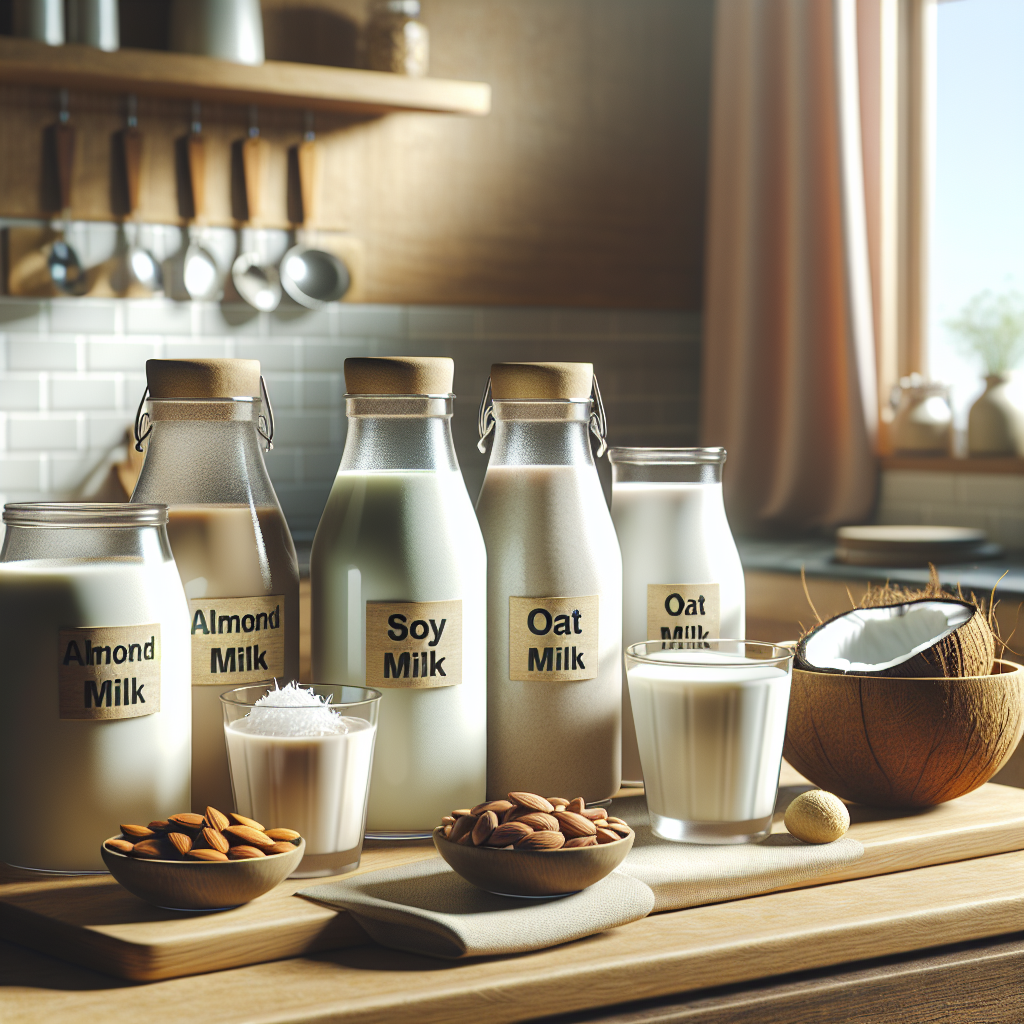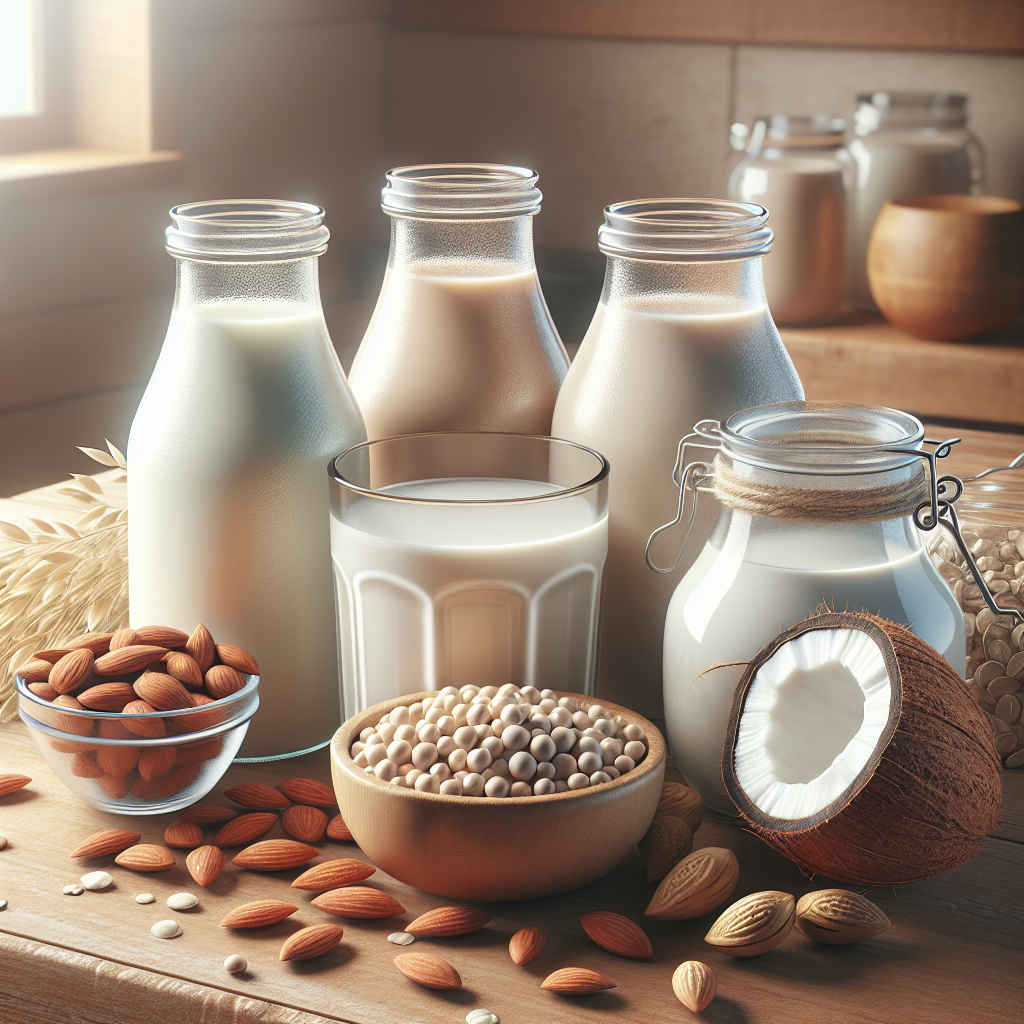Vegan milk, also known as plant-based milk, has been gaining popularity due to its numerous health benefits and eco-friendly properties. Unlike traditional cow's milk, vegan milk is derived from plants, making it a fantastic alternative for those who are lactose intolerant, allergic to dairy, or following a vegan lifestyle. With options like almond, soy, oat, and coconut milk, there is a plant-based milk to suit every taste and dietary need.
One of the most significant advantages of vegan milk is that it is *naturally lactose-free*. This makes it an excellent choice for individuals who experience digestive discomfort after consuming dairy products. Additionally, many plant-based milks are *fortified with essential vitamins and minerals* such as calcium, vitamin D, and vitamin B12, ensuring that they can adequately replace the nutritional profile of cow's milk.
Another compelling reason to switch to vegan milk is its *environmental impact*. Producing plant-based milk generally requires fewer resources, such as water and land, and results in lower greenhouse gas emissions compared to dairy milk production. By choosing vegan milk, you are making a more sustainable choice that benefits both your health and the planet.
Ready to experience the benefits of vegan milk for yourself? Get yours today! With our revolutionary blender, you can easily make fresh filtered, customized vegan milk at home in less than 60 seconds!
Health Benefits of Vegan Milk
When it comes to health benefits, vegan milk outshines traditional dairy in several ways. One of the primary advantages is that vegan milk is *cholesterol-free*, making it an excellent choice for those looking to maintain heart health. High cholesterol levels are linked to an increased risk of heart disease, and switching to plant-based milk can be a simple yet effective step in managing cholesterol levels.
Many types of vegan milk are also lower in *saturated fat* compared to cow's milk. Saturated fats are known to contribute to the buildup of fatty deposits in the arteries, which can lead to cardiovascular issues. By opting for plant-based milk, you can reduce your intake of saturated fats and support overall heart health.
Another noteworthy benefit of vegan milk is its *rich nutrient profile*. For example, almond milk is a good source of vitamin E, an antioxidant that helps protect your cells from damage. Soy milk, on the other hand, is high in protein, comparable to cow's milk, making it a great option for those who need a protein boost. Many plant-based milks are also fortified with essential vitamins and minerals like calcium, vitamin D, and B12, ensuring that you get the nutrients you need without compromising on your dietary choices.
For those with digestive concerns, vegan milk is often easier to digest. Since it is *naturally lactose-free*, it eliminates the risk of lactose intolerance symptoms such as bloating, gas, and diarrhea. Additionally, some plant-based milks contain prebiotic fibers that can promote a healthy gut microbiome, further enhancing digestive health.
In summary, incorporating vegan milk into your diet can offer a multitude of health benefits, from improved heart health to better digestion. It’s a nutritious, delicious, and versatile alternative that can easily fit into any lifestyle.
Popular Plant-Based Milk Options

The world of vegan milk offers a variety of delicious and nutritious options, each with its unique flavor profile and health benefits. Here are some of the most popular plant-based milk options:
- Almond Milk: Known for its light, nutty flavor, almond milk is a favorite among many. It’s low in calories and rich in vitamin E, an antioxidant that supports skin health. It’s also versatile, making it suitable for both sweet and savory dishes.
- Soy Milk: One of the most nutrient-dense options, soy milk is packed with protein, comparable to cow’s milk. It’s also a good source of potassium and can be fortified with calcium and vitamin D. Its creamy texture makes it ideal for coffee, smoothies, and baking.
- Oat Milk: With a naturally sweet taste and creamy texture, oat milk is gaining popularity rapidly. It’s an excellent source of fiber, particularly beta-glucan, which is known to support heart health by reducing cholesterol levels. Oat milk is also a sustainable choice, as oats require less water to grow compared to nuts.
- Coconut Milk: Made from the flesh of coconuts, this milk is rich and creamy with a distinct tropical flavor. It’s high in medium-chain triglycerides (MCTs), which can provide quick energy and support brain health. Coconut milk is perfect for curries, desserts, and coffee.
- Rice Milk: This milk is a good option for those with nut and soy allergies. It has a mild, sweet flavor and is often fortified with vitamins and minerals. Rice milk is lower in protein but can be a good source of carbohydrates for an energy boost.
- Cashew Milk: Creamy and slightly sweet, cashew milk is rich in healthy fats, vitamins, and minerals. It blends well into sauces, soups, and desserts, providing a luxurious texture and flavor.
These popular plant-based milk options offer something for everyone, whether you’re looking for a nutty flavor, creamy texture, or nutrient boost. Exploring different types allows you to find the perfect fit for your taste preferences and dietary needs.
How to Make Vegan Milk at Home

Creating your own vegan milk at home is a simple, satisfying process that allows you to enjoy fresh, preservative-free milk tailored to your taste. Here’s a basic guide to making some popular plant-based milks:
- Almond Milk: Start by soaking one cup of raw almonds in water for at least 8 hours or overnight. Drain and rinse the almonds, then blend them with 5 cups of fresh water until smooth. Strain the mixture through a nut milk bag or a fine mesh sieve, squeezing out as much liquid as possible. Sweeten to taste with a natural sweetener like dates or agave syrup.
- Soy Milk: Soak one cup of dried soybeans in water for 8-12 hours. Drain and rinse the beans, then blend with 5 cups of water until smooth. Boil the mixture for 20 minutes, stirring occasionally to prevent sticking. Strain through a cheesecloth or nut milk bag. Add sweeteners or flavorings like vanilla extract if desired.
- Oat Milk: Blend one cup of rolled oats with 5 cups of water until smooth. Strain through a fine mesh sieve or nut milk bag, but avoid squeezing too hard to prevent a slimy texture. Sweeten and flavor as you like.
- Coconut Milk: Blend 1 cups of unsweetened shredded coconut with 5 cups of hot water. Allow it to sit for a few minutes to soften. Blend again until smooth, then strain through a nut milk bag. Sweeten if desired.
- Cashew Milk: Soak one cup of raw cashews in water for at least 4 hours or overnight. Drain and rinse the cashews, then blend with 4 cups of water until completely smooth. Strain as needed.
SKIP THE STRAINING with the Milk Depot Milk Maker. No need for messy, time consuming, tedius nutbags. The Milk Maker filters the milk for you and is a breeze to clean.
By making your own vegan milk at home, you not only gain control over the ingredients but also reduce waste and save money. Plus, you can experiment with different flavors and sweeteners to create a beverage that’s perfectly suited to your preferences.
Eco-Friendly and Cost-Effective
Switching to homemade vegan milk is not only a healthier choice but also an environmentally conscious one. By making your own plant-based milk, you significantly reduce the environmental impact associated with traditional dairy farming and commercial plant-based milk production. Here’s how:
Reduction of Packaging Waste: Store-bought milk comes in plastic or tetra packs, which contribute to landfill waste and require energy to produce and recycle. When you make your milk at home, you can store it in reusable glass bottles or jars, cutting down on single-use packaging.
Lower Carbon Footprint: The transportation of commercial milk, whether dairy or plant-based, contributes to greenhouse gas emissions. By sourcing your raw ingredients locally and making your milk at home, you cut down on transportation-related carbon emissions.
Water Conservation: Dairy farming is notoriously water-intensive. While some plant-based options also require significant water, the overall water usage is typically lower than that of dairy production. By choosing to make your own, you can select ingredients that have a smaller water footprint.
Beyond the environmental benefits, making your own vegan milk is also highly cost-effective. Store-bought plant-based milks often come with a premium price due to packaging, branding, and distribution costs. By purchasing raw ingredients in bulk, you can save up to 90% compared to store-bought options. Plus, you have the flexibility to make just the amount you need, reducing waste from unused, spoiled milk.
In summary, homemade vegan milk not only benefits your health but also supports a more sustainable and economical lifestyle. By adopting this practice, you can enjoy delicious, fresh milk while making a positive impact on the planet.
Flavor Customization and Recipes

One of the most exciting aspects of making your own vegan milk is the ability to customize flavors to suit your taste preferences. Store-bought plant-based milks often come in limited flavors, but when you make your own, the possibilities are endless. Here are some delicious flavor ideas and recipes to get you started:
- Vanilla Almond Milk: Add a splash of vanilla extract and a sweetener of your choice (such as maple syrup or agave) to your homemade almond milk for a creamy, fragrant beverage that’s perfect for coffee or cereal.
- Chocolate Hazelnut Milk: Blend in a few teaspoons of cocoa powder and a touch of sweetener to create a rich, chocolatey drink reminiscent of your favorite hazelnut spread.
- Matcha Oat Milk: For a unique twist, blend in some matcha powder with your oat milk. This provides a boost of antioxidants and a subtle, earthy flavor that pairs well with breakfast foods.
- Berry Coconut Milk: Combine fresh or frozen berries with coconut milk for a fruity, tropical drink. This is a refreshing option for smoothies or simply enjoyed on its own.
- Spiced Cashew Milk: Add a pinch of cinnamon, nutmeg, and a bit of sweetener to your cashew milk for a warming, spiced beverage perfect for the colder months.
Experimenting with different nuts, grains, seeds, and flavorings allows you to create a personalized milk that’s not only delicious but also free from artificial additives and preservatives. Plus, you can control the sweetness and texture to match your exact preferences.
Ready to take your vegan milk experience to the next level? Get yours today! Our high-quality blender makes it easy to create fresh, customized plant-based milk in less than 60 seconds. Enjoy the freedom of flavor experimentation while saving money and reducing your environmental footprint.
